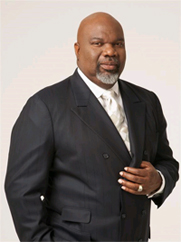 A short time ago I was given the chance to interview Bishop T.D. Jakes at a recent press junket for the movie Black Nativity. Though not in the movie, Jakes is one of the forces behind it. The room that they placed the pastor in was incredible in size – a lot bigger than was necessary for a short interview. In addition to the room, Jakes has a large personality and a deep baritone voice. I felt like I was meeting with royalty. However, within seconds, I was put to ease.
A short time ago I was given the chance to interview Bishop T.D. Jakes at a recent press junket for the movie Black Nativity. Though not in the movie, Jakes is one of the forces behind it. The room that they placed the pastor in was incredible in size – a lot bigger than was necessary for a short interview. In addition to the room, Jakes has a large personality and a deep baritone voice. I felt like I was meeting with royalty. However, within seconds, I was put to ease.
“You’re one busy guy,” I began.
“Tell me about it,” he replies chuckling.
“Did you ever think in your wildest dreams that you’d ever be involved in so much responsibility?”
“No, not at all. I didn’t really set out to be.” Says Jakes. “I set out to discover what was in me. That was a big curiosity for me. I knew that there was something in me and I think you spend your life unpacking what God has put inside of you and how interesting that is. And to have the courage to do that is important because sometimes people go the most simplistic route possible, but I think that all of us have things that we don’t always tap into.” Already I’m inspired. It took less than two minutes.
What inspired Jakes to live life to the fullest was watching his father get ill when he was only ten. He later died when Jakes was just sixteen. “It made me anxious to see what life was all about and not to take life for granted.”
T.D. Jakes is a full time pastor, a writer, movie-backer and television host. Where most of us would have settled for one or two of these, this over-achiever does it all. “It looks like a lot of different things, but to me, it’s all just communication,” he says. “Whether it’s in print of film or in the pulpit, everything I do is somehow and some way connected to communication and messages. The apostle Paul didn’t have blogs or Faithbook or Twitter or movies. They moved by camels and foot, but we are blessed to live in an age where we can communicate our messages in different languages and reach a broader audience and I really believe that Jesus said to go unto all of the world and to all of the world systems.”
So, just how does he do it all? “First of all, I have a great team of people around me. I think that is the most critical thing,” he says. “It’s having people around you who have your rhythm. I don’t micro-manage people.”
“Can you describe a typical day in the office?” I ask.
“There is no typical day and I love that because I bore easily. Routine gets monotonous to me. My day can go from East to West. Yesterday I spoke for a Presbyterian Hospice benefit in the morning then flew out here in the afternoon for Black Nativity. I’ve been on the phone this morning talking to people who lost loved ones in a car wreck and now here I am talking to you. Every day is different and challenging and I’ve learned not to expect to finish. To live with an understanding that you will never do everything that needs to be done, but you make a dent into it every day.” Again, I’m inspired.
The more I talk with the man, the more relaxed he seems. I ask him about that. “The weird thing about it is I consider myself to be a very ordinary person. That’s my big secret. People see me and think that I should act some sort of way you know? But I did everything in my life. My father taught me how to mop floors when I was a kid. I’ve worked construction. I’ve cut grass. I’ve done just about everything imaginable and I’ve never lost sight of that sense of normalcy.”
Jakes thinks of himself as rather calm but spirited person, but he also admits that is also a workaholic. “My base spirit is calm and I work from a place of peacefulness but I am also kind of energetic for my age too.”
What drew Jakes to back the Black Nativity project was his mother. “My mother was a huge fan of Langston Hughes, so, I grew up listening to her quote some of his works.” But the major reason was because he likes the story about a pastor trying to raise a family and run a church. “That’s me!” he says. “I thought that a very attractive point to bring out was that what makes you successful in church doesn’t always make you successful at home. And learning that and trying to figure out. I’ve raised five children so I deeply related to all of that. I think that people don’t understand it. They think that if you’re talented in one way, they think that you know everything. Just because you’re a great speaker doesn’t mean that you’re a great dad or make you good at balancing your checkbook because you can sing. Those assumptions lead people to think of lofty expectations that nobody can live up to. So I thought that was good.”
“And it’s also about a family, a single mother struggling, which is a large percentage of our population today. What I liked about it was that the family was not so “nice” and “neat” and predictable. They struggle to find a way to love each other and I thought that that was a good message for the holidays. When people look at TV and they see these perfect families and then they have just hung of the phone from yelling at somebody and they think that they don’t have it. This [movie] destroys that myth that in order to be successful. You have to find ways to love each other and to jump overcome hurdles to confront problems. Families are work. And yet there’s hope and it’s got a message of redemption.”
Not too long ago, Jakes added television host to his resume, Mind, Body Soul, airing at noon on the BET Network. “I’ve always wanted to communicate and listen. I’m a great listener and observer of people. I started making a few appearances with Dr. Phil and Oprah it was a natural progression for me to have my own show. I think that a lot of people don’t realize that though I am predominately known as a pastor, that doesn’t mean that I’m not a person. That doesn’t mean that I’m not interested in politics and food and health and life,” says Jakes. “I just did a show on gun violence. I can’t do that from the pulpit. I needed a venue for which I could communicate a wider array of subjects and I also think that it’s an opportunity to bring selected people of faith into a secular environment and expose them beyond the parameter of Christian television to a broader audience of people who are really hungry and I find fairly receptive to faith if it comes across in an intelligent way.”

